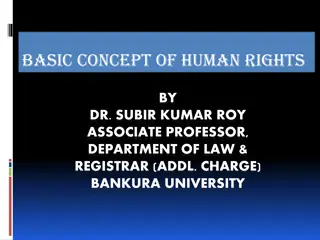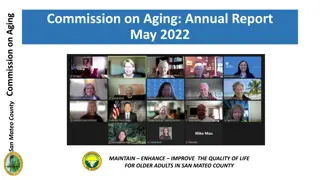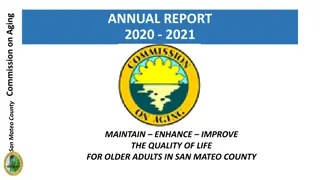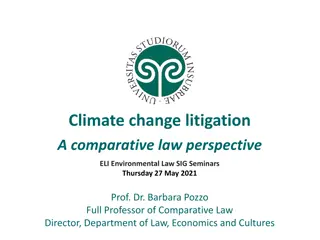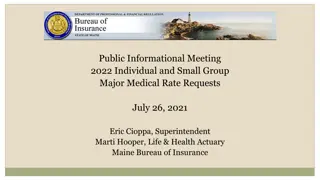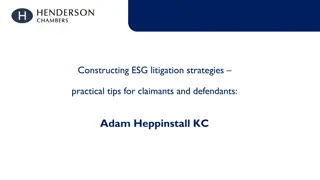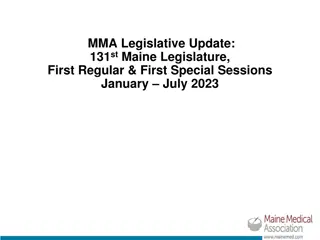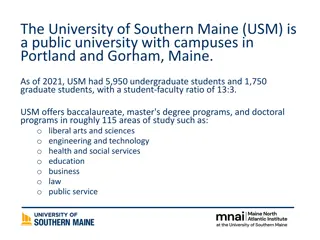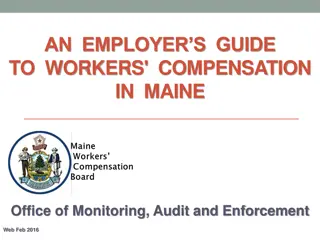Maine Human Rights Commission 2020 Annual Report and Litigation Updates
Maine Human Rights Commission's 2020 Annual Report highlights trends in complaints, case types, resolutions, and settlements. The report includes statistics on employment, housing, public accommodations, education, and various allegations. It also covers case resolutions, success rates, pending cases, total value of settlements, mediation success, litigation updates, and a notable case law update regarding a vaccine mandate lawsuit. The report provides insights into the commission's activities and outcomes in handling discrimination and human rights cases.
Download Presentation

Please find below an Image/Link to download the presentation.
The content on the website is provided AS IS for your information and personal use only. It may not be sold, licensed, or shared on other websites without obtaining consent from the author.If you encounter any issues during the download, it is possible that the publisher has removed the file from their server.
You are allowed to download the files provided on this website for personal or commercial use, subject to the condition that they are used lawfully. All files are the property of their respective owners.
The content on the website is provided AS IS for your information and personal use only. It may not be sold, licensed, or shared on other websites without obtaining consent from the author.
E N D
Presentation Transcript
2021 2021 Maine Human Rights Commission Maine Human Rights Commission and Litigation Updates and Litigation Updates
MHRC / Litigation Update MHRC 2020 Annual Report (issued February 25, 2021) Total complaints in FY 2020 775 ( 8%) Case types Employment 69% Housing 15% Public accommodations 14% Education 2% Employment allegations Disability 48.5% MHRA retaliation 39.4% Whistleblower 31.2% Sex 19.1% Sexual harassment 44.6% Age 11% Race 10.6%
MHRC / Litigation Update MHRC 2020 Annual Report Complete investigations with reports 34% Resolution before hearing 65% 196 settlements 132 RTS letters 108 administrative dismissals 23 withdrawals without benefits to claimant 238 Cases resolved at the Commission level RG rate in cases with investigator reports 17.6% ( 1%) RG rate when investigator s report contested 26% Overall RG rate for all filings 6% Overall NG rate 28% Contested hearings 117 Consent agenda 121 742 cases pending at end of FY 2020 ( 10%)
MHRC / Litigation Update MHRC 2020 Annual Report Total value of settlements - $4,160,696 ( 42%) MHRC mediation program 44% success rate (40 out of 90) Conciliation 15 cases successfully conciliated; $61,485 in monetary benefits Litigation 7 new complaints filed 1 amicus brief filed 3 cases pending at end of FY
MHRC / Litigation Update Case law updates Doe v. Mills et al (2021 U.S. App. LEXIS 31375) (1st Cir.) Lawsuit by Maine healthcare workers to enjoin enforcement of the State vaccine mandate Facts: longstanding Maine law requiring healthcare workers to be vaccinated against various diseases. Exemptions for (1) medical reasons, (2) religious beliefs, and (3) philosophical beliefs. In response to declining vaccination rates, Legislature in 2019 eliminates religious and philosophical exemptions. It then went to a people s veto referendum, with almost 75% of voters in favor of the amendment. Amendment takes effect in 2020. April 2021 Maine CDC updates regulations to reflect the 2020 amendments August 12, 2021 Maine HHS and CCD issue emergency rule to add COVID-19 to list of mandatory vaccinations Issue: plaintiffs claim to have sincerely held religious beliefs against vaccine due to use of fetal cells in research/production of vaccine Claim vaccine mandate is pre-empted by federal law (1st Amend., equal protection, supremacy clauses) and violates Title VII
MHRC / Case Law Updates Doe v. Mills et al Does not violate 1st Amendment A religiously neutral and generally applicable law that incidentally burdens free exercise rights will be upheld if it is rationally related to a legitimate government interest. A law which is not neutral or generally applicable will be upheld only if it is narrowly tailored to achieve a compelling governmental interest. 1st Circuit concluded the law passed either standard Rational basis Neutral - did not single out any particular religion or religious practices No evidence of singling out religion; also removed philosophical exemption General application did not burden religious conduct while exempting comparable secular conduct Medical and religious exemptions not comparable. Making someone who is medically contraindicated does not advance public health. Strict scrutiny Stemming spread of COVID unquestionably a compelling interest Narrowly tailored - evaluated available tools voluntary vaccination, testing, PPE, etc. Proved ineffective multiple outbreaks in healthcare facilities
MHRC / Litigation Update Doe v. Mills et al Equal protection rational basis due to failed 1st free exercise challenge Supremacy clause based on straw man argument that defendants claimed the protections of Title VII are inapplicable in the State of Maine Title VII no proof of irreparable harm; no likelihood of success on the merits Money damages ordinarily appropriate remedy for termination of employment Required to show genuinely extraordinary situation to warrant injunction Not met here due to failure to exhaust administrative remedies and failure to show why that should be excused No likelihood of success providing exemption would have been an undue hardship Next steps? Plaintiffs request for injunctive relief pending cert denied (Justice Breyer with Barrett & Kavanaugh) Serious dissent from Justices Gorsuch, Thomas, and Alito
MHRC / Litigation Update Gonzalez-Bermudez v. Abbott Labs, P.R., 990 F.3d37 (1st Cir. 2021) Discharged employee files claims of age discrimination and retaliation Age discrimination Based on a demotion Evidence disparate treatment claim, 2 younger employees were not demoted In order to be probative of discriminatory animus, a claim of disparate treatment must rest on proof that the proposed analogue is similarly situated in material respects. . . . [T]hey must be similar enough that apples are compared to apples. 2 comparators not similarly situated different positions, duties, and supervisors, no evidence of their job performance With comparators gone, no evidence that demotion was based on age Retaliation Based on failure to promote following her claim of age discrimination Evidence ER required interviewees for this position to do a mock presentation, which was not part of its normal application process. EE refused to do it, arguing cards were stacked against her EE was not qualified for this position because she refused to complete application process Mock presentation was related to the requirements of the position, and all interviewees had to do it. Not retaliatory. As a general rule, it is not for the plaintiff to predict the employer s hiring decision and then claim to be the victim of that predicted decision.
MHRC / Case Law Update Nadeau v. Twin Rivers Paper Co., LLC, 2021 ME 16 Whistleblower case in which the employee was part of a bargaining unit WPA provides the law shall not be construed to diminish or impair the rights of a person under any collective bargaining agreement. Federal Labor Management Relations Act provides that disputes involving the interpretation of CBAs (for companies involved in interstate commerce) are to be heard in federal court Facts: EE complained about health and safety issues, and then commits serious safety violations that would justify termination. ER puts him on a Last Chance Agreement instead of firing him, but which required him to forego certain protections under the CBA. EE signs, and then reports additional health and safety issues. He then had another serious safety violation and failed to report it. When the ER discovered what he had done, he was fired. He filed an unsuccessful grievance, but under the LCA said ER s decision on any grievance would be final with no right to appeal or arbitration. EEs argument: 1) ER violated CBA by putting him on LCA, and 2) his placement on LCA is evidence of retaliatory animus Held: Case preempted by federal law. The court would have to determine wither the CBA gave the ER the right to put him on the LCA. If yes, then allowing the WPA claim to proceed would diminish or impair the ER s rights under the LCA (which is prohibited by the WPA). But if LCA was invalid, then the ER could compel the EE to pursue the WPA claim in arbitration.
MHRC / Case Law Update Woodlands Senior Living, LLC v. Mas Med. Staffing Corp., 2020 U.S. Dist. LEXIS 219132 (D. Me. 2020), rev d on other grounds Woodlands = nursing home; MAS = temporary nursing agency Staffing Agreement MAS agrees not to actively recruit or solicit any EE of Woodlands, and MAS has to wait until 90 days of an EE s last day with Woodlands before hiring MAS recruited and hired several Woodlands EEs without waiting 90 days Osman Page, LLC v. Boothbay Region Water District, 2021 Me. Super. LEXIS 1 (Lincoln Cty., 2021) Osman Page = back-office accounting support Contract during contract and for 180 days after, BRWD will not solicit any EE of Osman Page. If BRWD hires an Osman Page in violation of that restriction, BRWD will pay a $50k placement fee to Osman Page Both cases Contracts were entered into years before Maine passed 26 MRS Section 599-B Issues: Does 599-B apply to staffing type arrangements? Finder s fee arrangements? Retroactivity versus prospective enforcement? Constitutional prohibitions on impairing vested contract rights / due process?
Thank You 207.947.4501 www.rudmanwinchell.com
Thank You 207.947.4501 www.rudmanwinchell.com






